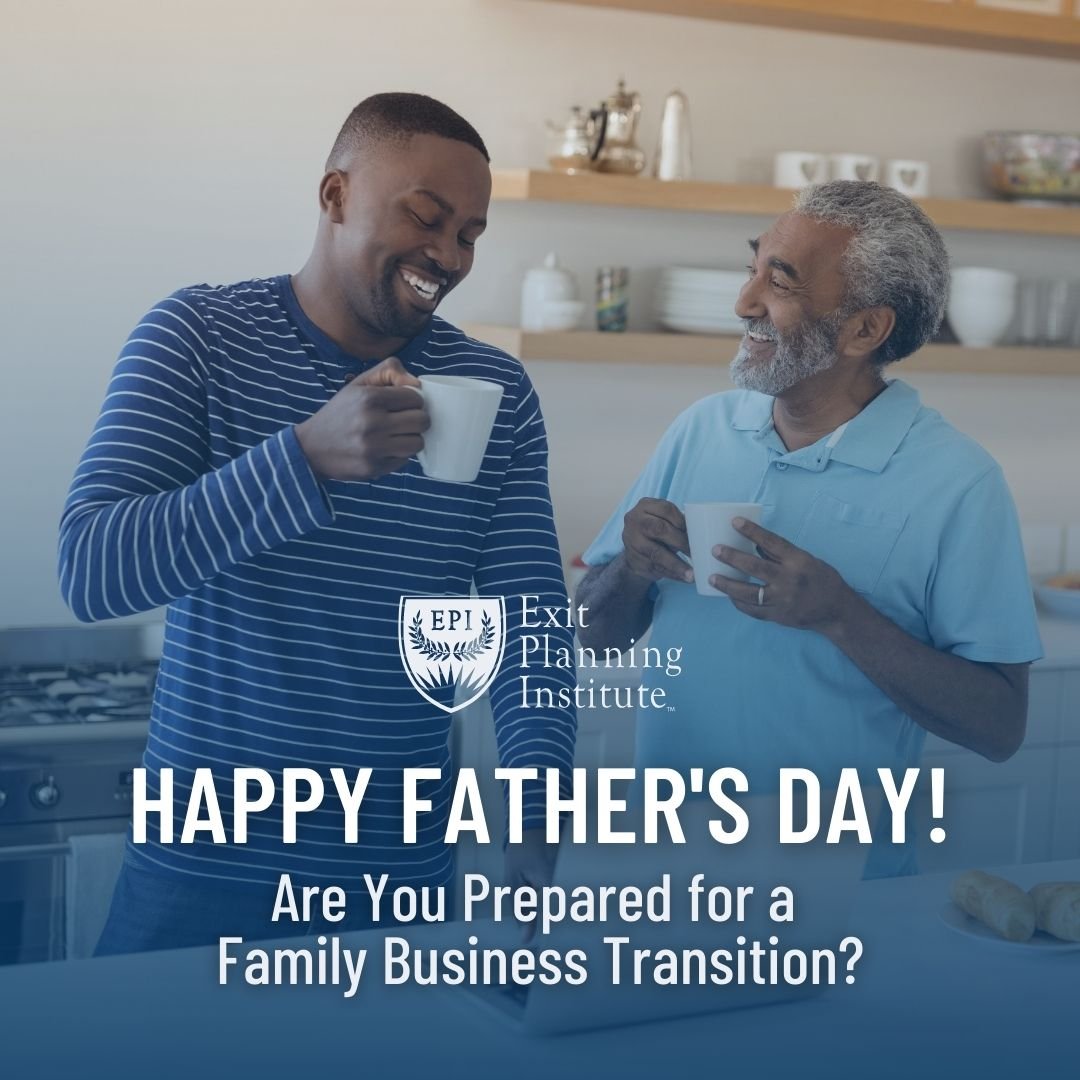
THE EXIT PLANNING BLOG
Keep up-to-date with exit planning, succession planning, industry trends, unique specialty insights, and useful content for professional advisors and business owners.
Share this
Are You Prepared for a Family Business Transition?
by Colleen Kowalski on June 17, 2022

A Father’s Day weekend typically includes some of your dad’s favorite activities. Some families will barbecue, others will take dad out for 18-holes of golf, and some might put on his favorite movie, pop some popcorn, and have a family movie night.
However, it is not likely that your family will spend the day discussing how to successfully transition Dad’s business to the next generation.
If you do, kudos to you on your preparedness. According to recent research from Exit Planning Institute, 45% of family business owners have never had a family meeting pertaining to their business.
We spoke with Isabel Botero, Ph.D., the Director of the Family Business Center and an associate professor of entrepreneurship at the University of Louisville, to understand the generational impact of exiting your family business.
How is the Current Generation Leading?
In a family business, it is likely that more than one generation is involved in the organization. About half of business owners want to transfer their business to a child but only 30% do so. Families are not without their conflicts, especially in family businesses. 32% of family businesses surveyed by PWC in 2012 were apprehensive about transferring the business to the next generation. 9% saw the possibility of family conflict as the cause of this apprehension.
The Family Business Center states that 43% of family business owners have no succession plan in place. This way of thinking can be detrimental to the future successes of the business – as well as family relationships. Without a proper succession plan in place, the next generation of the family business will be given a business that lacks the organization needed to thrive. If they even want to take over the business.
It is estimated that about 40% of family business owners expect to retire but less than half have a successor selected. In a family business, a successor can learn on the job and experience every aspect of the business, making them uniquely prepared to lead the company after the current generation retires. However, if the current owner does not have a successor selected, the amount of time available to train the future leader of the family business diminishes, as does the potential success of the company.
Isabel shares common challenges current owners face in their family businesses:
- The current generation does not have a plan on what to do after they leave the day-to-day operations of the business.
- Current generation does not believe that the next generation is ready to take over the business, so they do not give them opportunities to learn and become active in the business.
- The current generation does not have a plan to transfer responsibilities and /or ownership of the business.
Is the Next Generation Prepared?
About 40% of U.S. family-owned businesses transition into second-generation businesses, approximately 13% are passed down successfully to a third generation, while 3% survive to a fourth or beyond.
When discussing the possibility of transferring your family business to the next generation, you must consider family dynamics. Isabel explains, “At the core of a business-owning family is their relationship with one another. I think most of the family business owners I have worked with main concern is that the family can remain together. So when I think about how to help a family business work on the sale of the family business, I help the family understand what is it that they want together. I then make this part of the conversation to manage their dynamics.”
Isabel highlights some challenges that family businesses might face in the transition to the next generation.
These challenges include:
- The next generation is not old enough or prepared to enter the business.
- The next generation has not been educated or socialized inside the business so they can learn the sources of competitive advantage.
- There is no direct next generation.
One of the main challenges in all family businesses hoping to transition to the next generation is, of course, “what if the next generation does not want to run the business?” Isabel emphasizes the importance of family meetings to ensure the whole family understands the transition plan.
She shares, “Some of the issues that arise when the next generation does not want to take over are expressed in family conflict and pressures. Thus, as a family business advisor, it is important to help the current generation and the next generation work by communicating their desires and their fears too. This way it becomes a conversation about how they want to work together as a family to see where the future is.”
Is Your Family Ready to Transition the Business?
Isabel shares, “The Value Acceleration methodology helps the current generation think about their readiness and what they need to do to prepare themselves to move to their new stage in their lives. This is important because it helps the owner have conversations with the family, with the next generation, and with members of the business regarding what their goals are and how they can make these goals a reality. I think that these conversations really help the business family create a shared understanding of how they want to remain together and whether they want to work together or not.”
She continues, “Do they want to sell, do they want to remain owners together, or have a non-family professional manager? This helps create opportunities for the family to move from a family business to a business family.”
There are serious consequences to attempt transitioning your company if you are not personally and financially ready. Let alone if your business is not ready to be sold. Selling before being fully ready for the next generation to take over the business or finding the proper buyer, will leave your family dissatisfied with the post-business life.
Families can face the following challenges regarding the readiness they are to exit their business:
- The family does not have a shared purpose or vision of what they want to do together and how they want to work together.
- The family has been kept in the dark regarding what the current generation wants to do with the business or their intentions as they work together in the future.
CEPAs can view the Personal Readiness Scorecard in their Member Center.
Is Your Business Ready to be Transitioned?
The characteristics that make a business valuable to a third party are the same that make it valuable to the next generation: low risk and high transferable value. The personal and business actions needed to successfully transition a business are the same as those needed to develop the next generation of family business owners. Utilizing value acceleration leads exiting owners to more frequently successful intergenerational transitions.
A business is not valuable based on profits alone, but on the ability to sell at any moment. Scott Snider says that it is important to “Redefine what a best-in-class business is. Particularly for the next generation business owner. No matter how good your metrics are, your business value is low if your culture and customer engagement are low.”
Isabel says, “The Value Acceleration Methodology brings the conversation to how a business family can ensure the knowledge and competitiveness developed by the family throughout generations can be captured and transferred. This is essential for a business family to keep their legacy alive.”
Some challenges that impact the readiness of a business to be transitioned are:
- The employees are kept in the dark regarding the intention to have a next-generation family member join the business.
- The owner has not prepared the business to work without them.
Learn more from Isabel and other exit planning experts in our upcoming whitepaper. Request “Walking You Through the Perfect Exit – Personal Purpose-driven, Next Act Planning” below!
Share this
- Blog (550)
- CEPA (433)
- exit planning (249)
- CEPA community (189)
- Business Owner (176)
- Exit Planning Summit (100)
- EPI Chapter Network (89)
- Value Acceleration Methodology (81)
- Exit Planning Partner Network (76)
- EPI Announcement (50)
- Content (48)
- Webinars (37)
- Excellence in Exit Planning Awards (34)
- Marketing (30)
- 2024 Exit Planning Summit (28)
- 5 Stages of Value Maturity (26)
- Books (24)
- EPI Academy (24)
- EPI Team (22)
- Exit Planning Teams (22)
- Leadership (21)
- 2023 Exit Planning Summit (20)
- family business (20)
- women in business (19)
- Intangible Capital (18)
- Exit Options (17)
- Black Friday (16)
- CPA (15)
- Walking to Destiny (15)
- Chapters (14)
- State of Owner Readiness (14)
- charitable intent (13)
- Chris Snider (12)
- National Accounts (12)
- Small business (12)
- personal planning (12)
- Financial Advisors (11)
- Season of Deals (9)
- 5 Ds (8)
- About us (8)
- Podcast (8)
- Scott Snider (8)
- Insiders Bash (7)
- Christmas (6)
- Exit Planning Content Library (6)
- Case Studies (5)
- Owner Roundtables (5)
- Three Legs of the Stool (5)
- Value Advisors (5)
- financial planning (5)
- Awards (4)
- Circle of Excellence (4)
- DriveValue (4)
- EPI Thought Leadership Council (4)
- Exit & Succession (4)
- Five Ds (4)
- executive training (4)
- Owners Forum (3)
- author (3)
- forbes (3)
- Exit Is Now Podcast (2)
- Peter Christman (2)
- Veteran (2)
- Whitepapers (2)
- Annual Exit (1)
- Business Owners Forum (1)
- SOOR (1)
- business consultants (1)






